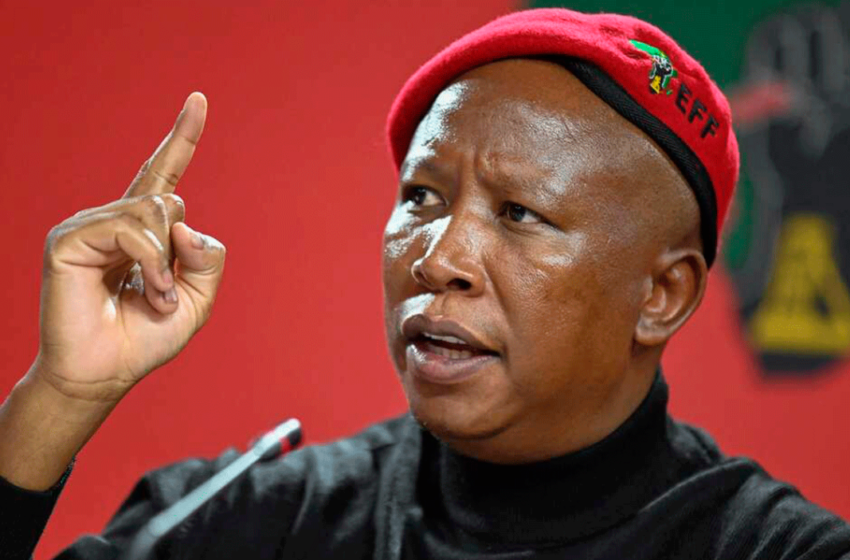Julius Malema: What will happen to EFF leader after hate speech guilty verdict?

Julius Malema
Julius Malema, leader of South Africa’s Economic Freedom Fighters (EFF), is facing one of the most consequential moments of his political career after the Western Cape Equality Court found him guilty of hate speech. The ruling stems from remarks he made during a 2022 rally where he urged supporters that they “must never be scared to kill.” Judge Mark Sher, in delivering the verdict, noted that such words had the “potential to incite racial violence on a large scale,” making the judgment a landmark in South Africa’s long-running debate over political speech and accountability.
The verdict itself is civil in nature, as the Equality Court is designed to address hate speech, unfair discrimination, and harassment under the Promotion of Equality and Prevention of Unfair Discrimination Act (PEPUDA). However, the implications extend far beyond the courtroom. The judgment not only places Malema in legal jeopardy but also raises pressing questions about his political future, his international standing, and the stability of the EFF as South Africa inches toward another pivotal election cycle.
READ ALSO
Julius Malema found guilty of hate speech as DA hails landmark court ruling
Legal Consequences
The Equality Court has a wide range of remedies at its disposal. It can compel Malema to issue a formal public apology, order him to pay damages to affected groups, or even refer the matter for criminal prosecution if deemed necessary. While the court has not yet handed down a sentence, it is widely expected that Malema will be required to retract his statements and possibly compensate organizations or communities who lodged the complaint.
The prospect of criminal referral, while not automatic, cannot be ruled out. South African law allows hate-speech findings to be escalated into criminal matters, especially when the speech in question carries elements of incitement to violence. Should prosecutors pursue this path, Malema could face charges under the country’s criminal code—a development that would mark a serious escalation in his legal battles.
The Path of Appeal
Unsurprisingly, Malema and the EFF have vowed to fight the ruling. His legal team is preparing an appeal, most likely to the Supreme Court of Appeal, where they will argue that his remarks, however provocative, should be protected under freedom of speech provisions in the Constitution. Malema has long framed legal actions against him as attempts by political rivals and establishment forces to silence his movement.
This strategy may resonate with his loyal base, but the appeal process will place Malema under prolonged legal scrutiny. An appeal could drag on for months, if not years, ensuring that the hate speech judgment remains a shadow over his political activities well into the next election cycle.
Political Fallout
The political implications of this judgment are already reverberating across South Africa. Opposition parties, including the Democratic Alliance (DA) and lobby groups like AfriForum, have celebrated the verdict as a victory for the rule of law and civic harmony. The DA has signaled that it may push for parliamentary sanctions against Malema, arguing that hate speech from a political leader undermines the democratic project.
For the EFF, however, the ruling presents both a challenge and an opportunity. On the one hand, it could damage the party’s credibility among undecided voters who see the judgment as confirmation of Malema’s extremism. On the other, Malema may use the ruling to galvanize his base, portraying himself as a victim of political persecution and positioning the EFF as the only movement willing to challenge entrenched power structures.
International Implications
Malema’s troubles are not confined within South Africa’s borders. His rhetoric has previously earned him international criticism, including being barred from entry into the United Kingdom. With this new hate-speech conviction on record, further restrictions on international travel could follow, limiting his ability to engage in global political forums or represent the EFF abroad.
The guilty verdict may also deepen concerns among foreign investors about political stability in South Africa. Malema has always been a polarizing figure, and the ruling underscores the risks associated with his populist style. For a country seeking to reassure global markets, the international perception of its political leadership matters, and Malema’s conviction could be another flashpoint.
What Lies Ahead
The road ahead for Julius Malema is fraught with uncertainty. In the immediate future, he faces the Equality Court’s sentencing, where remedies could range from symbolic to financially and politically costly. Beyond that, the appeals process will keep the case in the spotlight, with each hearing reigniting public debate over the boundaries of free expression in South Africa.
Politically, Malema must navigate the fallout while keeping his movement intact. His ability to spin the judgment as a political attack could determine whether the EFF loses ground or gains sympathy. At the same time, he must manage internal party discipline and keep his supporters energized in the face of mounting legal challenges.
What is clear is that this ruling is not the end of the story but the beginning of a new chapter in Malema’s career. It places him at a crossroads: either tone down his rhetoric to avoid further legal entanglements or double down on his defiance, risking harsher penalties. Either way, South Africa’s political landscape will feel the impact of what happens next.

